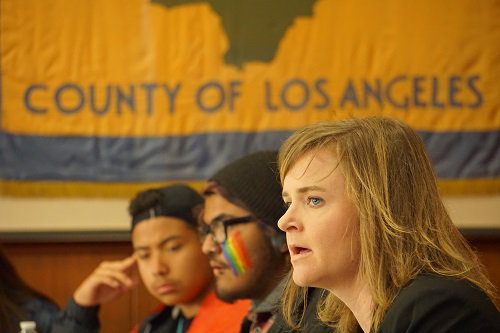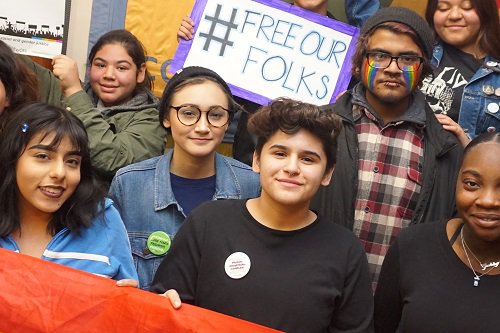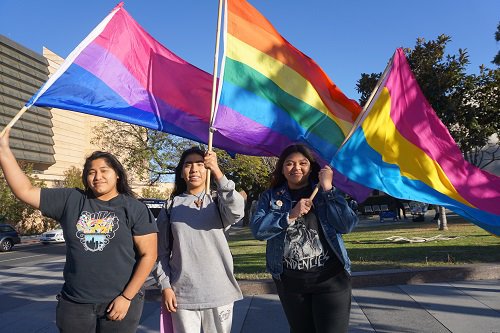Queer Youth Leaders Mobilize for GSA Day of Racial Justice
In February 2018, Liberty Hill partnered with the Genders and Sexualities Alliance (GSA) Network of Southern California—one of our grantees fighting to empower and train young LGBTQ leaders—to call on Los Angeles County elected officials to address issues of disproportionate criminalization and abusive treatment of LGBTQ youth of color. Over 60 youth took part in the event, called the GSA Day for Racial Justice. Many of the participating youth attended Liberty Hill’s Queer Justice Youth Leadership Program, which launched in 2016 to train LGBTQ youth to lead campaigns for their rights, and sparked efforts for gender neutral bathrooms and accurate data on the lived experiences of LGBTQ populations.

GSA’s Day for Racial Justice specifically targeted youth incarceration, and the impact it has on LGBTQ youth. Los Angeles County arrests and detains more young people than anywhere else in the nation, and in California, 19 percent of those in youth detention centers identify as lesbian, gay, transgender or gender non-conforming, while 90 percent are youth of color.
As part of the event, students advocated for the rights of detained and incarcerated young people by marching to the Los Angeles County administrative building and submitting a list of recommendations for how the County could go about addressing the unmet needs of LGBTQ youth in the juvenile justice system. “We really need assurance that we are going to have a voice in all of this,” said GSA organizer, Violeta Hernandez. She, along with the other youth organizers participating in the action, delivered 16 student letters to the office of Supervisor Solis, requesting the following set of actions:
- Close youth prisons and create community-based alternatives to youth incarceration.
- Reduce discrimination in the juvenile justice system.
- Improve safety and increase resources for LGBTQ youth in facilities and under community supervision.
- Create a decision-making body that includes youth to make sure that changes are implemented strategically with the meaningful involvement and partnership of young people.

The GSA Day for Racial Justice built on momentum from other advocacy efforts by LGBTQ youth to request greater focus on their needs in L.A. County. After youth activists testified in January 2018, the Los Angeles County Board of Supervisors unanimously passed a motion co-authored by Supervisor Solis, requiring five County departments (Probation, Mental Health, Physical Health, Public Health, and Child and Family Services) to create recommendations for how to better serve the County’s young LGBTQ residents.
This work is part of Liberty Hill’s increasing role in highlighting the need for policy and budget solutions that place a greater emphasis on prevention and youth development over incarceration—particularly among LGBTQ youth and youth of color. Through Liberty Hill’s new Agenda for a Just Future, which focuses on ending youth incarceration as we know it, the foundation has already begun fundraising to support programs that prevent instead of punish, has taken a leadership role in increasing resources to community organizations that offer youth diversion programs, so that more eligible youth are given the opportunity to avoid time in prison; and is working to provide leadership capacity to groups that organize youth to directly lead the fight for youth justice. Liberty Hill also hired youth justice advocate Julio Marcial as Director of Youth Justice, in order to lead efforts to reduce the number of youth arrested and incarcerated in Los Angeles County.

This year, young advocates from GSA chapters across the country have also focused their efforts on the traumatic effects on youth caused by the prison system and the overrepresentation of lesbian, gay, transgender and gender non-conforming young people imprisoned. Students and their adult allies cite a longitudinal study published in Pediatrics that found that youth who reported identifying as LGBTQ or having same-sex attractions were more likely to be stopped by police, expelled from school or arrested and convicted as children and adults. Especially for LGBTQ youth of color, transgender and gender non-conforming youth, these factors play a large role in increasing interactions with law enforcement and ultimately causing overrepresentation of LGBTQ youth in the juvenile and criminal justice systems in Los Angeles County.